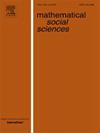Weighted fair division with matroid-rank valuations: Monotonicity and strategyproofness
IF 0.5
4区 经济学
Q4 ECONOMICS
引用次数: 2
Abstract
We study the problem of fairly allocating indivisible goods to agents with weights corresponding to their entitlements. Previous work has shown that, when agents have binary additive valuations, the maximum weighted Nash welfare rule is resource-, population-, and weight-monotone, satisfies group-strategyproofness, and can be implemented in polynomial time. We generalize these results to the class of weighted additive welfarist rules with concave functions and agents with matroid-rank (also known as binary submodular) valuations.
拟阵秩估值的加权公平划分:单调性和策略性
我们研究了将不可分割的商品公平分配给代理人的问题,代理人的权重与他们的权利相对应。先前的工作表明,当代理具有二元加性估值时,最大加权纳什福利规则是资源、种群和权重单调的,满足群策略性,并且可以在多项式时间内实现。我们将这些结果推广到一类具有凹函数的加权加性welfarist规则和具有拟阵秩(也称为二进制子模)估值的agent。
本文章由计算机程序翻译,如有差异,请以英文原文为准。
求助全文
约1分钟内获得全文
求助全文
来源期刊

Mathematical Social Sciences
数学-数学跨学科应用
CiteScore
1.30
自引率
0.00%
发文量
55
审稿时长
59 days
期刊介绍:
The international, interdisciplinary journal Mathematical Social Sciences publishes original research articles, survey papers, short notes and book reviews. The journal emphasizes the unity of mathematical modelling in economics, psychology, political sciences, sociology and other social sciences.
Topics of particular interest include the fundamental aspects of choice, information, and preferences (decision science) and of interaction (game theory and economic theory), the measurement of utility, welfare and inequality, the formal theories of justice and implementation, voting rules, cooperative games, fair division, cost allocation, bargaining, matching, social networks, and evolutionary and other dynamics models.
Papers published by the journal are mathematically rigorous but no bounds, from above or from below, limits their technical level. All mathematical techniques may be used. The articles should be self-contained and readable by social scientists trained in mathematics.
 求助内容:
求助内容: 应助结果提醒方式:
应助结果提醒方式:


